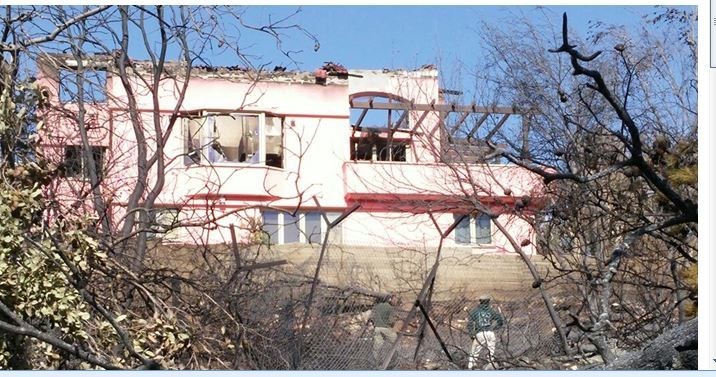Wildfires in Israel
Green scene
In the United States, we have learned to respect the destructive power of forest fires, particularly those occurring in areas suffering from drought and high winds. The loss of lives, as well as extensive property damage, is horrifying. Our own personal experience with a mild form of wildfire – and it was still plenty scary - happened in Alaska about 10 years ago. With low population density and a moister forest environment, the forest’s ecology required a natural burn in a relatively “cool fire” every 150 years. It was as benign as a forest fire can get, and it still sent us frightened New Yorkers escaping to Fairbanks.
Last week, the news reported extensive forest fires in Israel, which jumped into residential areas. In the United States, we have governmental fire departments in large cities, and in villages and small towns there are volunteer firefighters. My husband once remarked that the lack of large-scale fire-fighting options in Israel is due to the inflammable nature of construction materials. True, furniture and interior decorative elements are flammable, but in Israel, the building material is primarily stone and concrete, while in the United States, we use wood.
In 2010, there was horrific fire on Mt. Carmel, which consumed most of the Mediterranean forest south of Haifa. Because of the size of the blaze and the loss of life – 44 Prison Service cadets died trying to rescue inmates – Israel appealed to the international community, which responded with massive firefighting help. At that time, the Israel Fire and Rescue Service was created to form a professional, governmental institution with 2,500 professional firefighters and up to 400 “fire scout” volunteers.
Last weekend, after the conclusion of the Sabbath, we checked the news and discovered that Halamish - otherwise known as Neve Tzuf - had been entirely evacuated. While many of you may not specially remember the name of this small town, the Rosenbluhs live there. They were the subject of a previous article describing the olive harvest (the Masik), which takes place annually in their olive orchard. The link to that article is:
http://www.riverdalepress.com/stories/Olive-harvest-highlights-ancient-festival,61051
While we do not yet know about the condition of the orchard, their house – which they built for themselves and their growing family – looks like a gutted shell. It will be many days before it can be established whether the house is best demolished and rebuilt entirely. We can safely assume that all household goods and appliances are gone; the books, the artwork, the furniture, photos and family memorabilia and all clothing and linens are gone. Since Molotov cocktails have been found in sensitive forest areas nearby, we can be certain that this fire was arson and not caused by the natural conditions of very dry plant material, high winds and an unfortunate lightening strike.
Because there were fires in the area before Shabbos, the entire community had been put on alert by 4 p.m. that there might need to be an evacuation and everyone should pack a bag with necessities and be prepared to evacuate. At 10 p.m., the order to evacuate came through, and while 15 homes were destroyed, no one was hurt. Buses were available for those without transportation, and people were taken to and taken in by other communities. The Rosenbluhs, their married daughter together with her family, and a neighbor with six children, all ended up in Alon for the remainder of Shabbos with another Rosenbluh son. Afterwards, people were allowed back into Halamish to examine and protect their properties. Fortunately, funds were immediately available from the government to enable people to buy essentials so that they could better manage the next few weeks.
Today, where we understand better the ecological impact of large-scale destructive natural-type events, the ultimate costs of this type of weapon should be understood and its impact on the land. There is the obvious loss of organic material. However, there is loss of topsoil, of tons of carbon and nitrogen, which are lost to the atmosphere. This loss will affect future nutrient retention of the soil. Water infiltration is also greatly affected, as runoff of rain and snowmelt is greatly increased.
Israel has been engaged in reclaiming a formerly desolate land for more than 100 years. No doubt these burned over areas will be replanted, perhaps with an even greater understanding of what constitutes a proper balance of plants to prevent future fires. However, it is pitiful to see how shortsighted the arsonists are. It is like the sailors on a rowboat and one is drilling a hole under his own seat on the grounds that it will only affect him!






